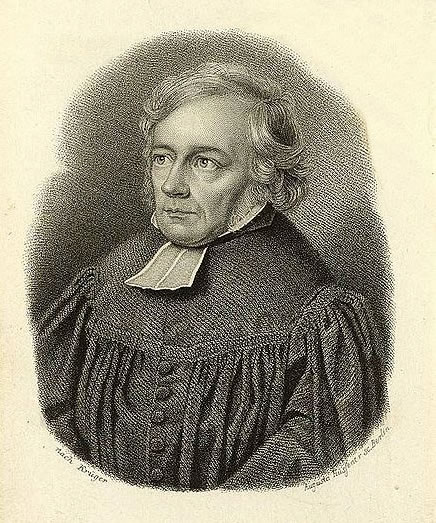
Friedrich Schleiermacher (1768-1834) , founder of Idealist spirituality
Outside of traditional Christianity, most of what counts as religion and “spirituality” in America nowadays is actually recycled German academic philosophy from two hundred years ago. This might sound absurd, or irrelevant. In this metablog series, I hope to show that it is true, and that it matters.
First, what are these bad ideas?
Eternalism. Everything is given meaning by some eternal ordering principle.
Some Idealists called that God, and were theists. Some called it the Absolute, and were atheists.
It doesn’t matter what you call it, because it is perfectly abstract. It has no characteristics. It is beyond conception. You cannot detect it or describe it, except that to say that is extremely wonderful.
Perennialism. Because God has no characteristics, all gods are just personifications of the Absolute.
Therefore, all religions are one. Ultimately, they uphold the same great truths.
The differences between religions are insignificant. They are cultural superstitions that the wise set aside, but tolerate in spiritually immature people who require personal gods, myths, rituals, and paraphernalia.
Monism. All beings are really just aspects of a single organic unity. Separateness is an illusion.
Therefore, details and specifics don’t matter. They are trivial. It is the universal that is important.
Idealism. True reality is the domain of Spirit, which is pure and simple. The material domain is contaminating and unreal. It is full of complexities that just cause suffering. You should pursue spiritual realization and leave mundane affairs behind.
True Self. What most people mistake as their selves is just an outer shell, the ego. It is created out of social conditioning and is divorced from our true essence.
The true self lies beneath the ego. It is normally hidden, but can be accessed through special means.
Because all things are ultimately One, the true self is mystically connected or identified with the Absolute Unity. Therefore, it is incredibly vast and deep, in contrast with the narrow pettiness of the ego.
Romanticism. The important thing in life is to connect with your true self, and thereby with the Absolute.
The ego works by means of intellectual reasoning, which is bad. The true self is emotional and intuitive, which is good.
The job of an artist is to express the Absolute. Once the intuitive emotional connection is made via the true self, ultimate reality spontaneously pours through the artist into the physical world. An artist is, therefore, a special kind of person, a priest and hero.
Destiny. As individuals, as a species, or as the entire universe, we are heading towards an inevitable, grand endpoint in which unity with the Absolute will be completed.
All these ideas are probably familiar. Many are almost right, and perhaps none is entirely wrong. They do incorporate important insights. It is not an accident that they dominated university philosophy departments during the Nineteenth Century. They are central themes of the German Romantic Idealist movement.
They may have a whiff of the New Age about them. But they seem now to be increasingly accepted by masses of people who wouldn’t get anywhere near the New Age, and do not know or care where the ideas came from.
Historical research suggests that Romantic Idealism is, indeed, the primary basis for current pop spirituality. I will trace the complex history of this—I am not sure in how much detail—in future posts. (Transcendentalism and New Thought were two key points in the lineage of transmission, along with the New Age of course. Similar ideas can be found elsewhere, particularly in Hindu Advaita Vedanta. There has been direct influence of Advaita on Western mass thinking today; but the German connection is greater.)
Historical interest aside, the pressing question is why these ideas are popular now, and what to do about it.
